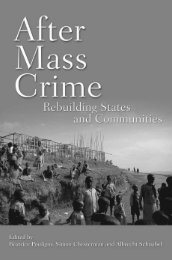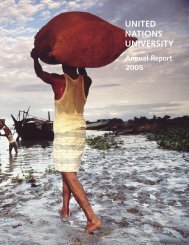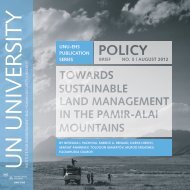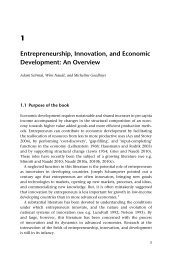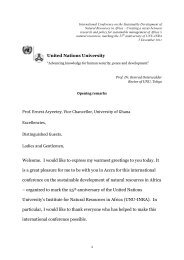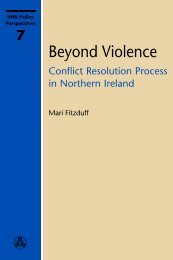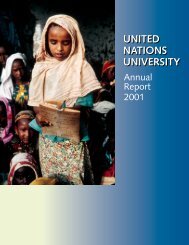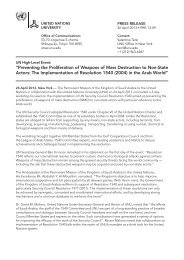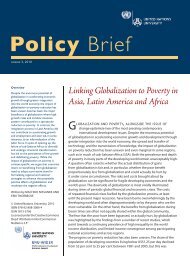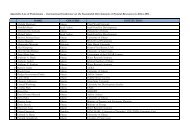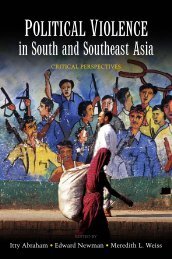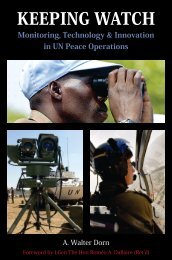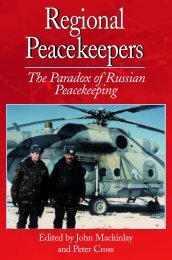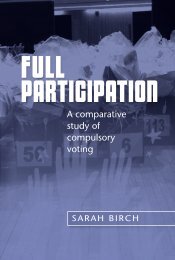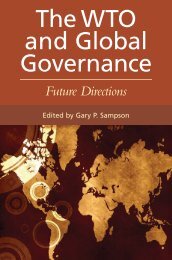Structural, Institutional and Normative Challenges - United Nations ...
Structural, Institutional and Normative Challenges - United Nations ...
Structural, Institutional and Normative Challenges - United Nations ...
Create successful ePaper yourself
Turn your PDF publications into a flip-book with our unique Google optimized e-Paper software.
<strong>Structural</strong>,<br />
<strong>Institutional</strong><br />
<strong>and</strong> <strong>Normative</strong><br />
<strong>Challenges</strong><br />
THE<br />
IRAQ<br />
CRISIS<br />
AND<br />
WORLD<br />
ORDER<br />
EDITED BY RAMESH THAKUR AND WAHEGURU PAL SINGH SIDHU
The Iraq crisis <strong>and</strong> world order:<br />
<strong>Structural</strong>, institutional <strong>and</strong><br />
normative challenges<br />
Edited by Ramesh Thakur <strong>and</strong> Waheguru Pal Singh Sidhu<br />
a<br />
<strong>United</strong> <strong>Nations</strong><br />
University Press<br />
TOKYO u NEW YORK u PARIS
Contents<br />
List of contributors....................................................<br />
ix<br />
Part I: Framing the issues ............................................ 1<br />
1 Iraq’s challenge to world order ................................... 3<br />
Ramesh Thakur <strong>and</strong> Waheguru Pal Singh Sidhu<br />
2 Lines in the s<strong>and</strong>: The <strong>United</strong> <strong>Nations</strong> in Iraq, 1980–2001 . . . . . 16<br />
David M. Malone <strong>and</strong> James Cockayne<br />
Part II: <strong>Structural</strong> <strong>and</strong> normative challenges ........................ 35<br />
3 The unipolar concert: Unipolarity <strong>and</strong> multilateralism in the<br />
age of globalization ............................................... 37<br />
Mohammed Ayoob <strong>and</strong> Matthew Zierler<br />
4 International peace <strong>and</strong> security <strong>and</strong> state sovereignty:<br />
Contesting norms <strong>and</strong> norm entrepreneurs ...................... 57<br />
Brian L. Job<br />
5 The world says no: The global movement against war<br />
in Iraq .............................................................. 75<br />
David Cortright<br />
v
vi<br />
CONTENTS<br />
Part III: Perspectives from within the region ....................... 93<br />
6 Iraq <strong>and</strong> world order: A Lebanese perspective.................. 95<br />
Latif Abul-Husn<br />
7 Iraq <strong>and</strong> world order: A Turkish perspective.................... 114<br />
Ayla Göl<br />
8 Iran’s assessment of the Iraq crisis <strong>and</strong> the post-9/11<br />
international order ................................................ 134<br />
Anoushiravan Ehteshami<br />
9 The Iraq crisis <strong>and</strong> world order: An Israeli perspective......... 161<br />
Mark A. Heller<br />
10 Egypt <strong>and</strong> the Iraq war ........................................... 175<br />
Ibrahim A. Karawan<br />
11 Reactions in the Muslim world to the Iraq conflict .............. 187<br />
Amin Saikal<br />
Part IV: External actor perspectives ................................ 201<br />
12 The <strong>United</strong> States <strong>and</strong> the <strong>United</strong> <strong>Nations</strong> in light of wars on<br />
terrorism <strong>and</strong> Iraq ................................................ 203<br />
Jane Boulden <strong>and</strong> Thomas G. Weiss<br />
13 Baghdad to Baghdad: The <strong>United</strong> Kingdom’s odyssey ......... 217<br />
A. J. R. Groom <strong>and</strong> Sally Morphet<br />
14 Explaining France’s opposition to the war against Iraq . ........ 234<br />
Jean-Marc Coicaud, with Hélène G<strong>and</strong>ois <strong>and</strong> Lysette<br />
Rutgers<br />
15 Iraq <strong>and</strong> world order: A Russian perspective ................... 249<br />
Ekaterina Stepanova<br />
16 Iraq <strong>and</strong> world order: A German perspective ................... 265<br />
Harald Müller<br />
17 Avoiding a strategic failure in the aftermath of the Iraq war:<br />
Partnership in peacebuilding ..................................... 282<br />
Chiyuki Aoi <strong>and</strong> Yozo Yokota
CONTENTS<br />
vii<br />
18 Iraq <strong>and</strong> world order: A Latin American perspective........... 298<br />
Mónica Serrano <strong>and</strong> Paul Kenny<br />
19 Iraq <strong>and</strong> world order: A Pakistani perspective .................. 315<br />
Hasan-Askari Rizvi<br />
20 Iraq <strong>and</strong> world order: A perspective on NATO’s relevance . . . . 328<br />
Fred Tanner<br />
21 The Iraq crisis <strong>and</strong> world order: A perspective from the<br />
European Union................................................... 344<br />
Luis Martinez<br />
22 Quicks<strong>and</strong> The <strong>United</strong> <strong>Nations</strong> in Iraq, 2001–2005 ............ 357<br />
David M. Malone <strong>and</strong> James Cockayne<br />
Part V: International legal <strong>and</strong> doctrinal issues ..................... 379<br />
23 The war in Iraq as illegal <strong>and</strong> illegitimate ....................... 381<br />
David Krieger<br />
24 Legitimacy as an assessment of existing legal st<strong>and</strong>ards:<br />
The case of the 2003 Iraq war .................................... 397<br />
Charlotte Ku<br />
25 The multinational action in Iraq <strong>and</strong> international law . . . . . . . . . 413<br />
Ruth Wedgwood<br />
26 Iraq <strong>and</strong> the social logic of international security ............... 426<br />
Jean-Marc Coicaud<br />
27 Justifying the Iraq war as a humanitarian intervention:<br />
The cure is worse than the disease ............................... 444<br />
Nicholas J. Wheeler <strong>and</strong> Justin Morris<br />
28 The responsibility to protect <strong>and</strong> the war on Saddam<br />
Hussein ............................................................ 464<br />
Ramesh Thakur<br />
29 Post-war relations between occupying powers <strong>and</strong> the <strong>United</strong><br />
<strong>Nations</strong>............................................................. 479<br />
Simon Chesterman
viii<br />
CONTENTS<br />
30 ‘‘Common enemies’’: The <strong>United</strong> States, Israel <strong>and</strong> the world<br />
crisis ............................................................... 497<br />
Tarak Barkawi<br />
Part VI: Conclusion .................................................. 517<br />
31 <strong>Structural</strong> <strong>and</strong> normative challenges ............................. 519<br />
James Cockayne <strong>and</strong> Cyrus Samii<br />
Index .................................................................. 535
Part I<br />
Framing the issues
1<br />
Iraq’s challenge to world order<br />
Ramesh Thakur <strong>and</strong> Waheguru Pal Singh Sidhu<br />
The <strong>United</strong> <strong>Nations</strong> (UN) is a collective instrument for organizing a volatile<br />
<strong>and</strong> dangerous world on a more predictable <strong>and</strong> orderly basis than<br />
would be possible without the existence of the international organization.<br />
It is the symbol of humanity’s hopes <strong>and</strong> dreams for a more secure world.<br />
If it did not exist, the <strong>United</strong> <strong>Nations</strong> surely would have to be invented.<br />
Most people still look to the <strong>United</strong> <strong>Nations</strong> as our best hope for a shared<br />
future, especially if it could be reformed to reflect today’s needs <strong>and</strong> realities.<br />
Yet, if some of its fiercest critics are to be believed, the damage the<br />
<strong>United</strong> <strong>Nations</strong> causes is such that it deserves to be de-invented.<br />
Indeed, because of these divergent views, the basis of world order, with<br />
the <strong>United</strong> <strong>Nations</strong> at the centre of the system of global governance, has<br />
come under increasing strain in recent years. One reason for this is inflated<br />
expectations of what the <strong>United</strong> <strong>Nations</strong> could accomplish. A second<br />
is that threats to peace <strong>and</strong> security <strong>and</strong> obstacles to economic development<br />
lie increasingly within rather than between states. A third is the<br />
growing gravity of threats rooted in non-state actors, including but not<br />
limited to terrorists. A fourth is the growing salience of weapons of mass<br />
destruction that, in their reach <strong>and</strong> destructiveness, challenge the basis of<br />
the territorial state. And the fifth is the growing disparity between the<br />
power of the <strong>United</strong> States <strong>and</strong> that of all other states, <strong>and</strong> the challenge<br />
that this poses to the Westphalian fiction of sovereign states equal in status,<br />
capacity, power <strong>and</strong> legitimacy.<br />
The Iraq war of March 2003 was a multiple assault on the foundations<br />
<strong>and</strong> rules of the existing UN-centred world order as well as the critical<br />
3
4 RAMESH THAKUR AND WAHEGURU PAL SINGH SIDHU<br />
transatlantic relationship. Post-war Iraq confirms that it is easier to wage<br />
war without UN blessing than it is to win the peace – but victory in war is<br />
pointless without a resulting secure peace. Speaking to the General Assembly<br />
on 23 September 2003, Secretary-General Kofi Annan noted that<br />
‘‘we have come to a fork in the road . . . a moment no less decisive than<br />
1945 itself, when the <strong>United</strong> <strong>Nations</strong> was founded’’.1 In a number of key<br />
meetings during <strong>and</strong> after World War II, world leaders drew up rules to<br />
govern international behaviour <strong>and</strong> established a network of institutions,<br />
centred on the <strong>United</strong> <strong>Nations</strong>, to work together for the common good.<br />
Both the rules <strong>and</strong> the institutions – the system of global governance<br />
with the <strong>United</strong> <strong>Nations</strong> as the core – face an existential challenge. On<br />
the one h<strong>and</strong>, Annan noted, the Iraq war could set a precedent for the<br />
‘‘proliferation of the unilateral <strong>and</strong> lawless use of force’’. On the other<br />
h<strong>and</strong>, he asked to what extent states might be resorting to unilateral instruments<br />
because of a loss of faith in ‘‘the adequacy <strong>and</strong> effectiveness of<br />
the rules <strong>and</strong> instruments’’ at their disposal. Consequently, the Iraq crisis<br />
became the primary motivation for Annan to announce the establishment<br />
of the High-level Panel on Threats, <strong>Challenges</strong> <strong>and</strong> Change.2 Although<br />
the m<strong>and</strong>ate for the Panel did not explicitly mention the need to examine<br />
the crucial relationship between the <strong>United</strong> <strong>Nations</strong> <strong>and</strong> the <strong>United</strong><br />
States, possibly its single most important member, there is no doubt that<br />
most of the deliberations as well as the recommendations of the report<br />
were informed by the state of relations between these two key actors in<br />
the world order.3<br />
Relations between the <strong>United</strong> States <strong>and</strong><br />
the <strong>United</strong> <strong>Nations</strong><br />
The relationship between the <strong>United</strong> <strong>Nations</strong> <strong>and</strong> the <strong>United</strong> States is as<br />
critical as it is difficult to get right. The central challenge of global governance<br />
is a double disconnect. First, there is a disconnect between the distribution<br />
of ‘‘hard’’ <strong>and</strong> ‘‘soft’’ power in the real world, on the one h<strong>and</strong>,<br />
<strong>and</strong> the distribution of decision-making authority in the existing intergovernmental<br />
institutions, on the other. The second disconnect is between<br />
the numbers <strong>and</strong> types of actor playing ever-exp<strong>and</strong>ing roles in civil, political<br />
<strong>and</strong> economic affairs within <strong>and</strong> among nations <strong>and</strong> the concentration<br />
of decision-making authority in intergovernmental institutions.<br />
In turn this has provoked a double crisis of legitimacy. With regard to<br />
the second disconnect, legitimacy is the conceptual rod that grounds the<br />
exercise of power by public authorities in the consent of the people, so<br />
the circuit is broken with the growing gulf between the will of the people<br />
<strong>and</strong> the actions of governments. As regards the first disconnect, legiti-
IRAQ’S CHALLENGE TO WORLD ORDER 5<br />
macy is the conceptual rod that connects power to authority, so the circuit<br />
is broken when power <strong>and</strong> authority diverge. The dominant power<br />
of the <strong>United</strong> States – military, economic, cultural, educational <strong>and</strong><br />
media – is the characteristic of contemporary international relations. The<br />
<strong>United</strong> States has an unparalleled capacity to use its ‘‘hard’’ <strong>and</strong> ‘‘soft’’<br />
power to push its own agenda. Without Washington’s participation, the<br />
provision of global public goods is impossible. Although major powers<br />
have always been able to play more important roles than lesser powers,<br />
the US capacity at present is historically unique for the Westphalian<br />
order.<br />
The <strong>United</strong> States is the world’s indispensable power; the supreme<br />
power <strong>and</strong> the hyper-power are other synonyms that have been used in<br />
recent times to describe this phenomenon. But the <strong>United</strong> <strong>Nations</strong> is the<br />
world’s indispensable institution, with unmatched legitimacy <strong>and</strong> authority,<br />
together with convening <strong>and</strong> mobilizing power. The Security Council<br />
is the core of the international law enforcement system <strong>and</strong> the chief body<br />
for building, consolidating <strong>and</strong> using the authority of the international<br />
community. For any international enforcement action to be efficient, it<br />
must be legitimate; for it to be legitimate, it must be in conformity with<br />
international law; for it to conform to international law, it must be consistent<br />
with the UN Charter. There will be times when UN-centred international<br />
diplomacy must be backed up by the credible threat of force.<br />
This can come only from the <strong>United</strong> States <strong>and</strong> its allies. In truth, the<br />
maintenance of world order since 1945 has depended more on US than<br />
UN ability <strong>and</strong> will. But the will to wage war will weaken if force is used<br />
recklessly, unwisely <strong>and</strong> prematurely. Progress towards a world of a<br />
rules-based, civilized international order requires that US force be put<br />
to the service of lawful international authority.<br />
The <strong>United</strong> <strong>Nations</strong> is the main embodiment of the principle of multilateralism<br />
<strong>and</strong> the principal vehicle for the pursuit of multilateral goals.<br />
After World War II, Washington was the chief architect of the normative<br />
structure of world order based on the international rule of law. There<br />
was, alongside this, deep <strong>and</strong> widespread confidence in the <strong>United</strong> States<br />
as a fundamentally trustworthy, balanced <strong>and</strong> responsible custodian of<br />
world order, albeit with occasional lapses <strong>and</strong> eccentricities. In the past<br />
few years Washington has engaged in a systematic belittling, denigrating<br />
<strong>and</strong> hollowing out of a whole series of treaties with respect to nuclear<br />
weapons, l<strong>and</strong>mines, international criminal prosecution, climate change<br />
<strong>and</strong> other regimes. In Iraq, the <strong>United</strong> States signalled that it would play<br />
by the rules of the world security institution that it helped create if, but<br />
only if, that institution bends to America’s will. Coming after years of<br />
US exceptionalism, this united most of the rest of the world against<br />
American unilateralism.
6 RAMESH THAKUR AND WAHEGURU PAL SINGH SIDHU<br />
The <strong>United</strong> <strong>Nations</strong> has the primary responsibility to maintain international<br />
peace <strong>and</strong> security, <strong>and</strong> is structured to discharge this responsibility<br />
in a multipolar world where the major powers have permanent<br />
membership of the key collective security decision-making body, namely<br />
the UN Security Council. The emergence of the <strong>United</strong> States as the sole<br />
superpower after the end of the Cold War distorted the structural balance<br />
in the UN schema. The ending of the Cold War also shifted the balance<br />
away from inter-state warfare to intra-state conflicts. The double<br />
question for the decision makers in Washington often became one of<br />
determining:<br />
whether US security <strong>and</strong> political interests were better served by engaging<br />
with distant <strong>and</strong> possibly inconsequential conflicts unilaterally,<br />
or through UN peace operations, or not at all; <strong>and</strong><br />
whether the consequences of this choice for the <strong>United</strong> <strong>Nations</strong>’ authority<br />
<strong>and</strong> capacity to keep the peace would have any rebound effects<br />
on the <strong>United</strong> States itself.<br />
The Security Council is the proper locus for authorizing <strong>and</strong> legitimizing<br />
the creation, deployment <strong>and</strong> use of military force under international<br />
auspices. But it is singularly ill suited to take charge of the comm<strong>and</strong><br />
<strong>and</strong> control of fighting forces. The <strong>United</strong> <strong>Nations</strong>’ own panel on<br />
peacekeeping concluded that ‘‘the <strong>United</strong> <strong>Nations</strong> does not wage war’’.4<br />
Accordingly, the burden of responsibility for international military engagement<br />
typically falls on the <strong>United</strong> States <strong>and</strong> its allies, which, as the<br />
world’s most powerful group, often can make the greatest difference.<br />
What is the optimal ‘‘mode of articulation’’ between the <strong>United</strong> <strong>Nations</strong><br />
as the authoritative custodian of international peace <strong>and</strong> world order <strong>and</strong><br />
the <strong>United</strong> States as its de facto underwriter Many American decision<br />
makers find it difficult to underst<strong>and</strong> why countries that do not contribute<br />
a ‘‘fair share’’ of the military burden should be given any determining<br />
role in deciding on the deployment of US military forces. In 1992, Richard<br />
Cheney, then Defense Secretary in the administration of George<br />
H. W. Bush, remarked that critics of the <strong>United</strong> States should remember<br />
that world order was maintained by the <strong>United</strong> States, not the <strong>United</strong><br />
<strong>Nations</strong>. As William Pfaff notes, the statement reflected two dominant<br />
American views. First, given its history of isolationism, the <strong>United</strong> States<br />
did not seek such a role but accepted the responsibility (flowing from<br />
its power) thrust upon it after World War II. Second, the <strong>United</strong> States<br />
is uniquely qualified to be the sole superpower because it is a virtuous<br />
power.5<br />
One of the main reasons for the US rejection of the League of <strong>Nations</strong><br />
afterWorldWarIwasfearofanautomatic requirement to use military<br />
force as decided by the League. The symbolic shift of the world organization’s<br />
headquarters after World War II from Geneva to New York did
IRAQ’S CHALLENGE TO WORLD ORDER 7<br />
not lessen the innate American suspicion of overseas entanglements at<br />
others’ behest. As Sarah Sewell notes, the <strong>United</strong> <strong>Nations</strong> remains a<br />
lightning rod for many US concerns about distracting entanglements of<br />
US forces overseas.6 The US Congress was careful to enunciate that decisions<br />
by the Security Council could not encroach upon the internal constitutional<br />
distribution of war-making power in the <strong>United</strong> States.<br />
Operation Desert Storm, launched in 1991 to expel Iraqi troops from<br />
Kuwait, generated unwarranted <strong>and</strong> unsustainable optimism about the<br />
centrality of the <strong>United</strong> <strong>Nations</strong> in the new world order, <strong>and</strong> about the<br />
degree to which the <strong>United</strong> States was prepared to place its military<br />
power at the disposal of the <strong>United</strong> <strong>Nations</strong>. This idealism was ephemeral<br />
because it was based on a unique confluence of circumstances that<br />
had produced a fortuitous conjunction of national US interests <strong>and</strong> the<br />
international interest. President George H. W. Bush left office on a cautiously<br />
optimistic note with regard to US–UN relations in the realm<br />
of international peace operations. The initial, naive enthusiasm of the<br />
succeeding Clinton administration, which assumed office committed to<br />
enlarging US involvement in exp<strong>and</strong>ing UN peace operations, quickly<br />
faded in the face of hard realities, notably the complexities of external intervention<br />
in civil wars. Since then it has become evident that the administration<br />
of the day must grapple with five interlinked <strong>and</strong> challenging<br />
questions concerning when <strong>and</strong> how Washington should:<br />
1. offer political support to UN missions;<br />
2. provide military assistance to them;<br />
3. participate in possible combat operations through them;<br />
4. enhance the peacekeeping credentials of the <strong>United</strong> <strong>Nations</strong>; <strong>and</strong><br />
5. opt for military action outside the UN framework.<br />
The five policy dilemmas suggest that the division between unilateralism<br />
<strong>and</strong> multilateralism in American foreign policy with respect to international<br />
peace operations is a false dichotomy. The relationship is dynamic,<br />
not static; <strong>and</strong> multifaceted, not unidimensional. The <strong>United</strong> States remained<br />
essentially multilateral throughout the 1990s. Significant signs of<br />
unilateralism surfaced only in 2001, after President George W. Bush took<br />
office. But what did change over the course of the 1990s was the centrality<br />
of the <strong>United</strong> <strong>Nations</strong> in the US scheme of multilateralism. Learning<br />
from experience in a world no longer divided by the Cold War blocs<br />
yet facing messy internal conflicts, Washington progressively divided<br />
its multilateral impulse between the <strong>United</strong> <strong>Nations</strong> as the global mobilizing<br />
<strong>and</strong> legitimizing organization, the North Atlantic Treaty Organization<br />
(NATO) as the strategic enforcement arm for peace operations in<br />
Europe, <strong>and</strong> ad hoc coalitions of the willing for theatres beyond NATO’s<br />
traditional area of operations. Outside Europe, Washington progressively<br />
retrenched from direct participation in UN peacekeeping, but not neces-
8 RAMESH THAKUR AND WAHEGURU PAL SINGH SIDHU<br />
sarily from all forms of involvement in them. At the end of the spectrum,<br />
if the <strong>United</strong> <strong>Nations</strong> is unable or unwilling to acquit itself of the ‘‘responsibility<br />
to protect’’7 victims of genocide, ethnic cleansing or other<br />
egregious humanitarian atrocities, Washington can forge multilateral coalitions<br />
of the willing to lead military interventions to stop the atrocities.<br />
Multilateralism – the coordination of relations among several states<br />
in accordance with certain principles (such as sovereign equality)8 –<br />
remains important to US foreign policy <strong>and</strong> the <strong>United</strong> States remains<br />
the pivot of multilateral action in the maintenance of international peace<br />
<strong>and</strong> security. Because the world is essentially anarchic, it is fundamentally<br />
insecure, characterized by strategic uncertainty <strong>and</strong> complexity resulting<br />
from too many actors with multiple goals <strong>and</strong> interests <strong>and</strong> variable<br />
capabilities <strong>and</strong> convictions. Collective action embedded in international<br />
institutions that mirror mainly American value preferences <strong>and</strong> interests<br />
enhances predictability, reduces uncertainty <strong>and</strong> cuts the transaction costs<br />
of international action in the pursuit of US foreign policy. ‘‘America<br />
First’’ nationalists are sceptical of the value of the <strong>United</strong> <strong>Nations</strong> to US<br />
foreign policy, viewing it more as a constraint. Why should US power be<br />
harnessed to the goals of others Multilateralism implies bargaining <strong>and</strong><br />
accommodation, <strong>and</strong> compromise is integraltosuchmultilateralnegotiation.<br />
But US power <strong>and</strong> assets are such that Washington does not need to<br />
compromise on core values <strong>and</strong> interests. Liberal institutionalists, in contrast,<br />
believe that multilateral organizations can externalize such bedrock<br />
US values as respect for the rule of law, due process <strong>and</strong> human rights.<br />
Multilateralism rests on assumptions of the indivisibility of the benefits of<br />
collective public goods such as peace (as well as international telecommunications,<br />
transportation, <strong>and</strong> so on) <strong>and</strong> diffuse reciprocity (whereby<br />
collective action arrangements confer an equivalence of benefits, not on<br />
every issue <strong>and</strong> every occasion, but in aggregate <strong>and</strong> over time).9<br />
US power, wealth <strong>and</strong> politics are too deeply intertwined with the<br />
cross-currents of international affairs for disengagement to be a credible<br />
or sustainable policy posture for the world’s only superpower. In their insular<br />
innocence <strong>and</strong> in-your-face exceptionalism,10 Americans had long<br />
embraced the illusion of security behind supposedly impregnable lines of<br />
continental defence. The terrorist attacks of 11 September 2001 proved<br />
the vulnerability of the US homel<strong>and</strong> to quarrels rooted in complex conflicts<br />
in distant l<strong>and</strong>s.<br />
If isolationism is not an option in today’s globally interconnected<br />
world, unilateralism – the robust use of military force to project US interests<br />
<strong>and</strong> promote American values overseas – cannot be the strategy of<br />
choice either. Like the two world wars, the ‘‘war’’ against global terrorism<br />
is neither one from which America can stay disengaged, nor one that<br />
it can win on its own, nor is it one that can be won without full US en-
IRAQ’S CHALLENGE TO WORLD ORDER 9<br />
gagement.11 A world in which every country retreated into unilateralism<br />
would not provide a better guarantee of US national security, now <strong>and</strong><br />
for the foreseeable future, than do multilateral regimes.<br />
Exceptionalism is also deeply flawed. Washington cannot construct a<br />
worldinwhichallothershavetoobey universal norms <strong>and</strong> rules, whereas<br />
the <strong>United</strong> States can opt out whenever, as often, <strong>and</strong> for as long as it<br />
likes with respect to nuclear tests, l<strong>and</strong>mines, international criminal prosecution,<br />
climate change <strong>and</strong> other regimes. Richard Haass, former Director<br />
of the Policy Planning Unit at the US State Department, called this ‘‘a<br />
la carte multilateralism’’,12 <strong>and</strong> some others privately call it, even more<br />
insultingly, ‘‘disposable multilateralism’’.<br />
In the case of non-UN operations, the <strong>United</strong> States would prefer<br />
to obtain the legitimating approbation of the <strong>United</strong> <strong>Nations</strong> if possible,<br />
in the form of enabling UN Security Council resolutions authorizing the<br />
operations. But the <strong>United</strong> States is most unlikely to accept a prior Security<br />
Council resolution as a m<strong>and</strong>atory requirement for the use of military<br />
force overseas. The problematic element in this comes from the equally<br />
compelling US interest in promoting the norm of the <strong>United</strong> <strong>Nations</strong><br />
being the only collective legitimator of international military action.<br />
Washington thus faces an unresolved <strong>and</strong> irreconcilable dilemma between<br />
instilling the principle of multilateralism as the world order norm,<br />
<strong>and</strong> exempting itself from the same principle because of its sustaining <strong>and</strong><br />
enduring belief in exceptionalism, in its identity as the virtuous power.<br />
The contradiction came to a head in 2003 in relation to the Iraq<br />
war. Most non-Americans found it difficult to see how one country could<br />
enforce UN resolutions by defying the authority of the world body,<br />
denigrating it as irrelevant <strong>and</strong> belittling its role in reconstruction efforts<br />
after the war. As the year drew to a close, the future <strong>and</strong> prestige of<br />
the <strong>United</strong> <strong>Nations</strong> were under scrutiny as never before. The Iraq war<br />
proved to be doubly damaging to the <strong>United</strong> <strong>Nations</strong>. Those who went<br />
to war condemned the world organization for lacking the courage of its<br />
convictions with regard to 12 years of Security Council resolutions dem<strong>and</strong>ing<br />
full Iraqi compliance. Those who opposed the war condemned<br />
the <strong>United</strong> <strong>Nations</strong> for lacking the courage of its convictions as an antiwar<br />
organization by not censuring an illegal war <strong>and</strong> punishing the<br />
aggressors.<br />
Was the war inevitable<br />
In September 2002 President George W. Bush famously warned the<br />
<strong>United</strong> <strong>Nations</strong> of irrelevance if the organization failed to enforce its resolutions<br />
on recalcitrant outlaws. The confusing compromises of multi-
10 RAMESHTHAKURANDWAHEGURUPALSINGHSIDHU<br />
lateralism were cornered by the moral clarity of an administration willing<br />
to distinguish good from evil <strong>and</strong> determined to promote one <strong>and</strong> destroy<br />
the other. For Washington, the issues could hardly have been more serious.<br />
Could one of the world’s most brutal regimes be permitted to remain<br />
in power until it succeeded in acquiring the world’s most destructive<br />
weapons The concurrent crisis with North Korea proved the wisdom of<br />
dealing with Saddam Hussein before he got his h<strong>and</strong>s on nuclear or other<br />
equally powerful weapons – for it would have been next to impossible to<br />
defang him after he had usable weapons of mass destruction <strong>and</strong> delivery<br />
systems.13 America’s threat of war, unilaterally if necessary, galvanized<br />
the <strong>United</strong> <strong>Nations</strong> into putting teeth into the inspection machinery <strong>and</strong><br />
produced unprecedented cooperation from the Iraqis.<br />
However, cooperation from Baghdad would not have lasted forever.<br />
Based on all previous experience, international pressure would have<br />
slackened with the passage of time, <strong>and</strong> Saddam would have returned<br />
to his familiar game of cheat, deny, defy <strong>and</strong> retreat. His survival after<br />
full US military mobilization would have gravely dented US global credibility.<br />
In that case, the <strong>United</strong> <strong>Nations</strong>, with no independent military capability,<br />
would have lost its most potent enforcement agent (the <strong>United</strong><br />
States) even as other would-be tyrants would have been emboldened.<br />
The resulting political backlash in the <strong>United</strong> States would have imperilled<br />
continued American membership, <strong>and</strong> the <strong>United</strong> <strong>Nations</strong> would<br />
have become the twenty-first century’s League of <strong>Nations</strong>.<br />
The contrary argument accepted UN authorization as necessary,<br />
but not sufficient, <strong>and</strong> preferred UN irrelevance to complicity. For all its<br />
moral authority, many feared that the <strong>United</strong> <strong>Nations</strong> lacks moral clarity.<br />
The record of the Security Council is not especially notable for a sense of<br />
moral compass <strong>and</strong> the courage of international convictions. There was a<br />
growing sentiment that, if the <strong>United</strong> <strong>Nations</strong> was bribed <strong>and</strong> bullied into<br />
submission <strong>and</strong> sanctioned war, the legitimacy of the <strong>United</strong> <strong>Nations</strong><br />
itself, as the guardian of the rule of law <strong>and</strong> the protector of the weak,<br />
would have been eroded instead of being stamped on military action<br />
against Iraq. People look to the <strong>United</strong> <strong>Nations</strong> to stop war, not to wage<br />
one, especially one based on the revolutionary doctrine of pre-emption.<br />
In the ensuing six months leading up to the war, instead of a pro forma<br />
test of UN relevance, the agenda shifted to being a litmus test of US legitimacy.<br />
In the end, the US argument failed to carry the world. Among<br />
the reasons for the strong worldwide anti-war sentiment were doubts<br />
over the justification for going to war; anxiety about the human toll, uncontrollable<br />
course <strong>and</strong> incalculable consequences of war in an already<br />
inflamed <strong>and</strong> extremely volatile region; <strong>and</strong> scepticism that the <strong>United</strong><br />
States would stay engaged – politically, economically <strong>and</strong> militarily – for<br />
the years of reconstruction required after a war. Washington found it especially<br />
difficult to convince others of the need to go to war – against Iraq
IRAQ’S CHALLENGE TO WORLD ORDER 11<br />
rather than against other states that posed a clearer <strong>and</strong> more present<br />
danger in their programmes of weapons of mass destruction or in their<br />
culpability with respect to links to international terrorism, <strong>and</strong> now<br />
rather than later – <strong>and</strong> did not help its cause by a continually shifting justification.<br />
The costs incurred, even before the war began, included fissures<br />
in the three great institutions of peace <strong>and</strong> order since World War<br />
II: the <strong>United</strong> <strong>Nations</strong>, NATO <strong>and</strong> the European Union.<br />
Moreover, the war (without UN authorization), though swift <strong>and</strong> decisive,<br />
does not appear to have been as effective as the threat of war. The<br />
ousting of Saddam Hussein might eventually pave the way for a brighter<br />
future for Iraqis but the credibility <strong>and</strong> authority of the <strong>United</strong> <strong>Nations</strong><br />
appear to have been gravely damaged, <strong>and</strong> it is not clear that the prestige<br />
of the <strong>United</strong> States has been greatly enhanced. There was grave disquiet<br />
that the <strong>United</strong> <strong>Nations</strong> was being subverted by the US agenda, <strong>and</strong> that<br />
it risked becoming to the <strong>United</strong> States what the Warsaw Pact was to the<br />
old Soviet Union: a collective mechanism for legitimizing the dominant<br />
power’s hegemonism. In a worrying portent for the <strong>United</strong> <strong>Nations</strong>, significant<br />
groups in many countries voiced the heretical thought that<br />
they would not have supported a war against Iraq even if backed by the<br />
<strong>United</strong> <strong>Nations</strong>. For many of them, the <strong>United</strong> <strong>Nations</strong> subsequently<br />
largely legitimized the Iraq war through its recognition <strong>and</strong> endorsement<br />
of the aftermath of the Iraq war, in particular the occupation of the country<br />
by the coalition forces <strong>and</strong> the transfer of Iraqi sovereignty to the<br />
transitional government.<br />
Iraq as a political earthquake<br />
Wars are cataclysmic events. Out of the destruction of major wars<br />
emerge new fault-lines of international politics. To this extent, wars are<br />
the international, political equivalent of earthquakes, eruptions on the<br />
surface reflecting deeper underlying seismic shifts in the pattern of major<br />
power relations. The Cold War was unusual because of the longevity<br />
of the conflict <strong>and</strong> because of the peaceful manner in which it ended.<br />
The tectonic shifts ushered in by the realignment of forces after the Cold<br />
War were all the more significant, but they were hidden from view for an<br />
unusually long time because of the peaceful resolution. It took the 9/11<br />
terrorist attacks to force the pace of change <strong>and</strong> sharpen the new post–<br />
Cold War contours of international politics. This new shape became<br />
more visible after the Iraq war.<br />
The most pressing task in ‘‘post-war’’ Iraq became to stabilize the security<br />
situation, establish a transitional political authority, initiate the necessary<br />
steps for post-war reconstruction, peacebuilding <strong>and</strong> reconciliation,<br />
<strong>and</strong> embed these in durable institutions <strong>and</strong> structures sufficiently
12 RAMESHTHAKURANDWAHEGURUPALSINGHSIDHU<br />
resilient to survive the withdrawal of a foreign presence in due course.<br />
The larger goal in the region was to assuage the humiliation inflicted on<br />
the collective Arab identity, deal with legitimate Palestinian grievances<br />
with the same mix of boldness <strong>and</strong> firmness shown in Iraq, impress upon<br />
the Arab world in general the need for deep political, social <strong>and</strong> economic<br />
reforms, eradicate terrorism from the region, <strong>and</strong> assure Israel’s<br />
long-term security <strong>and</strong> survival.<br />
There was also the larger question of the changing nature of threats<br />
in the modern world, the inadequacy of existing norms <strong>and</strong> laws in addressing<br />
such threats, <strong>and</strong> thus the need for new ‘‘rules of the game’’ to<br />
replace them. The urgent task was to devise an institutional framework<br />
that could marry prudent anticipatory self-defence to the centuries-old<br />
dream of a world in which force is put to the service of law, which protects<br />
the innocent without shielding the criminals.<br />
This is why the Iraq war has the potential to reshape the bases of world<br />
order in fundamental, profound <strong>and</strong> long-lasting ways. For, arguably, the<br />
Bush administration seeks to replace:<br />
self-defence (wars of necessity) with preventive aggression (wars of<br />
choice);<br />
the tried, tested <strong>and</strong> successful strategy of containment with the<br />
untried, untested, potentially destabilizing yet possibly unavoidable<br />
doctrine of pre-emption;<br />
negative deterrence with positive compulsion;<br />
non-proliferation <strong>and</strong> disarmament, as represented in the Treaty on<br />
the Non-proliferation of Nuclear Weapons (NPT) package, with nonproliferation<br />
on its own;<br />
universal non-proliferation as per the NPT with differentiated nonproliferation,<br />
where the proliferating countries’ relationship with the<br />
NPT is subordinated to their relations with the <strong>United</strong> States. USfriendly<br />
countries such as Israel are not on the list of countries of concern,<br />
whereas US-hostile countries are grouped into the ‘‘axis of evil’’<br />
<strong>and</strong> US-ambivalent/neutral countries such as India become objects of<br />
watchful caution;<br />
a multilateral system of global governance centred on the <strong>United</strong> <strong>Nations</strong><br />
with a unilateral system of US pre-eminence;<br />
leadership by consent-cum-persuasion with leadership by comm<strong>and</strong><br />
<strong>and</strong> control;<br />
the European search for a new world order, based on the Kantian transition<br />
from barbarism to culture through liberal institutionalism, with<br />
the old world order, discarded by Europe after centuries of increasingly<br />
destructive warfare, based on force of arms; <strong>and</strong><br />
the Westphalian order of sovereign <strong>and</strong> equal states with a post-<br />
Westphalian order of one pre-eminent if virtuous power.
IRAQ’S CHALLENGE TO WORLD ORDER 13<br />
The long list of fundamental changes suggests that we will continue to<br />
live in interesting times. It is difficult to deny that many of today’s institutions<br />
<strong>and</strong> systems are indeed out of date <strong>and</strong> incapable of meeting contemporary<br />
challenges. Even if Washington was wrong with regard to the<br />
particular case of Iraq, it may still be right in respect of the general argument<br />
about the institutionalized incapacity of existing mechanisms to<br />
cope with today’s changed <strong>and</strong> fast-changing threats. The evolution of<br />
institutions of international governance has lagged behind the rapid<br />
emergence of collective problems with on-border <strong>and</strong> cross-border dimensions.<br />
Any one intervention does not simply violate the sovereignty<br />
of any given target state in any one instance; it also challenges the<br />
principle of a society of states resting on a system of well-understood<br />
<strong>and</strong> habitually obeyed rules. Does the solution – or even one possible<br />
solution – to this lie in amending existing rules <strong>and</strong> institutions If these<br />
are incapable of change, do they deserve to be ab<strong>and</strong>oned Or should<br />
they be jettisoned only when replaced by new <strong>and</strong> improved successor<br />
laws <strong>and</strong> institutions, because otherwise, in the resulting authority vacuum,<br />
anarchy rules – <strong>and</strong> this is not acceptable If regime change is to<br />
be a legitimate goal, must we make the argument for that, agree on the<br />
criteria of legitimate statehood, <strong>and</strong> amend or replace the UN Charter<br />
accordingly The report of the UN Secretary-General’s High-level Panel<br />
on Threats, <strong>Challenges</strong> <strong>and</strong> Change is both an acknowledgement of this<br />
dilemma as well as a valiant, if partial, effort to address it.<br />
Outline of the book<br />
The key questions provoked by the above observations are: was the Iraq<br />
war a symptom of tectonic change or, alternatively, was it an event that<br />
might precipitate a collapse of the current world order That is, do we<br />
need to think in terms of an impending paradigmatic shift, or will modifications<br />
to the current architecture suffice<br />
In the wake of Iraq, how will key countries, significant regional organizations<br />
<strong>and</strong> surviving international institutions deal with an unfamiliar<br />
post-Westphalian order of one pre-eminent if virtuous power How will<br />
the growing divergence between legality <strong>and</strong> legitimacy, which bitterly<br />
divided not only the international community but also domestic opinion,<br />
be bridged in the course of this significant transition<br />
To address these issues, the volume begins with a historical chapter<br />
that examines the origins of the Iraq crisis in 1980. This chapter draws attention<br />
to two critical moments in the story: first, the Security Council’s<br />
inadequate, indeed misguided, reaction to Iraq’s attack on Iran in 1980;
14 RAMESHTHAKURANDWAHEGURUPALSINGHSIDHU<br />
<strong>and</strong>, second, the unilateral imposition by France, the <strong>United</strong> Kingdom<br />
<strong>and</strong> the <strong>United</strong> States of ‘‘no-fly zones’’ over Iraq in early 1991 <strong>and</strong> the<br />
launch of Operation Provide Comfort, a harbinger of unilateral initiatives<br />
that would sunder the unity of the Security Council’s purpose <strong>and</strong><br />
decisions on Iraq after 1998. The rest of the volume is divided into area<br />
<strong>and</strong> thematic/conceptual chapters.<br />
Part II examines some crucial structural <strong>and</strong> normative issues in the<br />
light of the Iraq crisis: unipolarity <strong>and</strong> Westphalian sovereignty; the disconnect<br />
between threats to international peace <strong>and</strong> security <strong>and</strong> state<br />
sovereignty; <strong>and</strong> the rise of a global public opinion against the war. The<br />
six chapters in Part III offer perspectives from Iraq’s immediate neighbourhood<br />
– the so-called broader Middle East – <strong>and</strong> examine the implications<br />
of the ongoing Iraq crisis for the key countries in the region <strong>and</strong><br />
their evolving relationships with both the UN-centred world order as well<br />
as the <strong>United</strong> States. Part IV provides perspectives on the Iraq crisis from<br />
further afield. It looks at the role played by four of the permanent five<br />
members of the Security Council (the <strong>United</strong> States, the <strong>United</strong> Kingdom,<br />
France <strong>and</strong> Russia), as well as by Germany, Japan, Pakistan, Latin<br />
America, NATO, the European Union <strong>and</strong> the UN Security Council<br />
throughout the Iraq crisis <strong>and</strong> the implications of their actions in the<br />
emerging world order. Part V looks at the legal <strong>and</strong> doctrinal implications<br />
of the Iraq war, including the responsibility to protect norms; the<br />
universalization of human rights norms; the international use of force<br />
<strong>and</strong> the legality <strong>and</strong> legitimacy of the war on Iraq; <strong>and</strong> post-war relations<br />
between occupying powers <strong>and</strong> the <strong>United</strong> <strong>Nations</strong>.<br />
Conclusion<br />
The <strong>United</strong> States has global power, soft as well as hard; the <strong>United</strong> <strong>Nations</strong><br />
is the fount of international authority. Progress towards international<br />
civilization requires that US power be harnessed to UN authority,<br />
so that force is put to the service of law. Through their bitter separation<br />
over Iraq, the <strong>United</strong> States <strong>and</strong> the <strong>United</strong> <strong>Nations</strong> provoked a legitimacy<br />
crisis about both US power <strong>and</strong> UN authority. The <strong>United</strong> States’<br />
certainty of moral clarity – values that it espouses <strong>and</strong> principles in defence<br />
of which it is prepared to st<strong>and</strong> up <strong>and</strong> be counted – put the US<br />
leadership on a course that seriously eroded its moral authority in the exercise<br />
of world power. The <strong>United</strong> <strong>Nations</strong>’ lack of a sense of moral clarity<br />
diminished its moral authority. The <strong>United</strong> <strong>Nations</strong> is the arena<br />
for collective action, not a forum where nations that are unable to do<br />
anything individually get together to decide that nothing can be done<br />
collectively.
IRAQ’S CHALLENGE TO WORLD ORDER 15<br />
Notes<br />
1. The text of the Secretary-General’s address can be found at hhttp://www.un.org/apps/sg/<br />
printsgstats.aspnid=517i.<br />
2. Ibid.<br />
3. The report of the Panel can be found at hhttp://www.un.org/secureworld/i.<br />
4. Report of the Panel on <strong>United</strong> <strong>Nations</strong> Peace Operations, UN Doc. A/55/305-S/2000/809,<br />
21 August 2000, para. 53.<br />
5. William Pfaff, ‘‘Europe Is Unqualified for the World Role It Seeks’’, International Herald<br />
Tribune, 26–27 May 2001.<br />
6. Sarah B. Sewell, ‘‘Multilateral Peace Operations’’, in Stewart Patrick <strong>and</strong> Shepard Forman,<br />
eds, Multilateralism <strong>and</strong> US Foreign Policy: Ambivalent Engagement (Boulder,<br />
CO: Lynne Rienner, 2002), p. 209.<br />
7. The phrase is from The Responsibility to Protect: Report of the International Commission<br />
on Intervention <strong>and</strong> State Sovereignty (Ottawa: International Development<br />
Research Centre for ICISS, 2001). Ramesh Thakur served as one of the ICISS<br />
Commissioners.<br />
8. John G. Ruggie, ‘‘Multilateralism: The Anatomy of an Institution’’, in John G. Ruggie,<br />
ed., Multilateralism Matters: The Theory <strong>and</strong> Praxis of an <strong>Institutional</strong> Form (New York:<br />
Columbia University Press, 1993), pp. 8–11.<br />
9. Robert Keohane, ‘‘Reciprocity in International Relations’’, International Organization,<br />
Vol. 40, No. 1 (Winter 1986), pp. 1–27.<br />
10. For the importance of the sense of exceptionalism in US foreign policy, see Samuel P.<br />
Huntington, ‘‘American Ideals versus American Institutions’’, in G. John Ikenberry,<br />
ed., American Foreign Policy: Theoretical Essays (3rd edn, New York: Longman,<br />
1999), pp. 221–253.<br />
11. See Ramesh Thakur <strong>and</strong> Hans van Ginkel, ‘‘An International Perspective on Global<br />
Terrorism’’, <strong>United</strong> <strong>Nations</strong> Chronicle, Vol. 38, No. 3 (September–November 2001),<br />
pp. 71–73.<br />
12. Quoted in Thom Shanker, ‘‘Bush’s Way: ‘A la Carte’ Approach to Treaties’’, International<br />
Herald Tribune, 1 August 2001.<br />
13. The issue of ‘‘weapons of mass destruction’’ was the focus of the second workshop of<br />
this project held in Japan on 18–23 October 2004, starting at the Asia-Pacific University<br />
in Beppu <strong>and</strong> concluding at Ritsumeikan University in Kyoto. That work will be published<br />
as a companion volume to this book: Arms Control after Iraq: <strong>Normative</strong> <strong>and</strong> Operational<br />
<strong>Challenges</strong>, edited by Waheguru Pal Singh Sidhu <strong>and</strong> Ramesh Thakur (Tokyo:<br />
<strong>United</strong> <strong>Nations</strong> University Press, forthcoming).
6 <strong>United</strong> <strong>Nations</strong> University, 2006<br />
The views expressed in this publication are those of the authors <strong>and</strong> do not necessarily<br />
reflect the views of the <strong>United</strong> <strong>Nations</strong> University.<br />
<strong>United</strong> <strong>Nations</strong> University Press<br />
<strong>United</strong> <strong>Nations</strong> University, 53-70, Jingumae 5-chome,<br />
Shibuya-ku, Tokyo, 150-8925, Japan<br />
Tel: þ81-3-3499-2811 Fax: þ81-3-3406-7345<br />
E-mail: sales@hq.unu.edu general enquiries: press@hq.unu.edu<br />
http://www.unu.edu<br />
<strong>United</strong> <strong>Nations</strong> University Office at the <strong>United</strong> <strong>Nations</strong>, New York<br />
2 <strong>United</strong> <strong>Nations</strong> Plaza, Room DC2-2062, New York, NY 10017, USA<br />
Tel: þ1-212-963-6387 Fax: þ1-212-371-9454<br />
E-mail: unuona@ony.unu.edu<br />
<strong>United</strong> <strong>Nations</strong> University Press is the publishing division of the <strong>United</strong> <strong>Nations</strong><br />
University.<br />
Cover design by Rebecca S. Neimark, Twenty-Six Letters<br />
Cover photograph by Peter Payne<br />
Printed in Hong Kong<br />
ISBN 92-808-1128-2<br />
Library of Congress Cataloging-in-Publication Data<br />
The Iraq crisis <strong>and</strong> world order : structural, institutional <strong>and</strong> normative<br />
challenges / edited by Ramesh Thakur <strong>and</strong> Waheguru Pal Singh Sidhu.<br />
p. cm.<br />
Includes bibliographical references <strong>and</strong> index.<br />
ISBN 9280811282 (pbk.)<br />
1. Iraq War, 2003– 2. World politics—21st century. I. Thakur, Ramesh<br />
Ch<strong>and</strong>ra, 1948– II. Sidhu, Waheguru Pal Singh.<br />
DS79.76.I7255 2006<br />
956.7044 0 31—dc22 2006019926
The Iraq Crisis <strong>and</strong> World Order: <strong>Structural</strong>, <strong>Institutional</strong> <strong>and</strong><br />
<strong>Normative</strong> <strong>Challenges</strong><br />
Edited by Ramesh Thakur <strong>and</strong> Waheguru Pal Singh Sidhu<br />
Contributors:<br />
Ramesh Thakur<br />
Waheguru Pal<br />
Singh Sidhu<br />
David M. Malone<br />
James Cockayne<br />
Mohammed Ayoob<br />
Matthew Zierler<br />
Brian L. Job<br />
David Cortright<br />
Latif Abul-Husn<br />
Ayla Göl<br />
Anoushiravan<br />
Ehteshami<br />
Mark A. Heller<br />
Ibrahim A. Karawan<br />
Amin Saikal<br />
Jane Boulden<br />
Thomas G. Weiss<br />
A.J.R. Groom<br />
Sally Morphet<br />
Jean-Marc Coicaud<br />
Hélène G<strong>and</strong>ois<br />
Lysette Rutgers<br />
Ekaterina Stepanova<br />
Harald Mueller<br />
Chiyuki Aoi<br />
Yozo Yokota<br />
Mónica Serrano<br />
Paul Kenny<br />
Hasan Askari Rizvi<br />
Fred Tanner<br />
Luis Martinez<br />
David Krieger<br />
Charlotte Ku<br />
Ruth Wedgwood<br />
Nicholas J. Wheeler<br />
Justin Morris<br />
Simon Chesterman<br />
Tarak Barkawi<br />
The Iraq war was a multiple assault on the foundations <strong>and</strong> rules<br />
of the existing UN-centred world order. It called into question the<br />
adequacy of the existing institutions for articulating global norms<br />
<strong>and</strong> enforcing compliance with the dem<strong>and</strong>s of the international<br />
community. It highlighted also the unwillingness of some key countries<br />
to wait until definitive proof before acting to meet the danger of<br />
the world’s most destructive weapons falling into the h<strong>and</strong>s of the<br />
world’s most dangerous regimes. It was simultaneously a test of the<br />
UN’s willingness <strong>and</strong> ability to deal with brutal dictatorships <strong>and</strong> a<br />
searching scrutiny of the nature <strong>and</strong> exercise of American power.<br />
The <strong>United</strong> States is the world’s indispensable power, but the <strong>United</strong><br />
<strong>Nations</strong> is the world’s indispensable institution. The UN Security<br />
Council is the core of the international law enforcement system <strong>and</strong><br />
the chief body for building, consolidating <strong>and</strong> using the authority of<br />
the international community. The <strong>United</strong> <strong>Nations</strong> has the primary<br />
responsibility to maintain international peace <strong>and</strong> security, <strong>and</strong><br />
is structured to discharge this responsibility in a multipolar world<br />
where the major powers have permanent membership of the key<br />
collective security decision-making body, namely the UN Security<br />
Council.<br />
The emergence of the <strong>United</strong> States as the sole superpower after<br />
the end of the Cold War distorted the structural balance in the UN<br />
schema. Progress towards a world of a rules-based, civilized international<br />
order requires that US force be put to the service of lawful<br />
international authority. This book examines these major normative<br />
<strong>and</strong> structural challenges from a number of different perspectives.<br />
Ramesh Thakur is the Senior Vice-Rector of the <strong>United</strong> <strong>Nations</strong><br />
University, Japan, <strong>and</strong> an Assistant Secretary-General of the <strong>United</strong><br />
<strong>Nations</strong>.<br />
Waheguru Pal Singh Sidhu is a Faculty Member at the Geneva<br />
Centre for Security Policy, Switzerl<strong>and</strong>.<br />
Order from:<br />
Book information:<br />
ISBN 92-808-1128-2;<br />
556pp; US$49.00<br />
53-70, Jingumae 5-chome, Shibuya-ku, Tokyo 150-8925, Japan<br />
Tel +81-3-3499-2811; Fax +81-3-3406-7345<br />
E-mail: sales@hq.unu.edu; http://www.unu.edu



